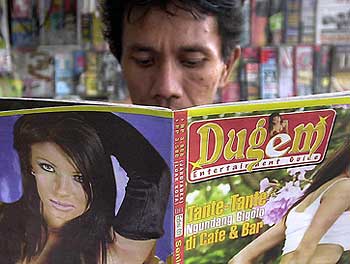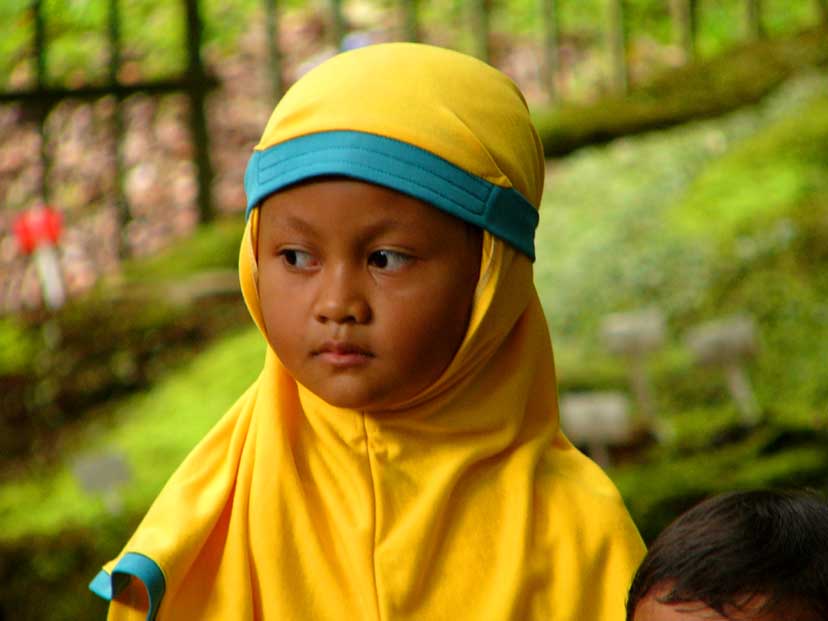Andre Vltchek
Here it goes again. Uncles with harsh over-smoked voices from Indonesia’s House of Representatives – that is synonymous with corruption and laziness – droning on about morality and about “how to protect the nation” from the ills of pornography. This time they have succeeded. While the nation was off guard, distracted by soaring food prices, a collapsing road system and general hopelessness, the House of Representatives on March 25th 2008 passed a bill banning all pornographic websites, threatening to jail users and providers who will now face up to three years in prison or a substantial fine. To be sure, Indonesia is still “softer” than Saudi Arabia, but the new bill is as tough or even tougher than anti-pornography laws in many other Muslim countries. What are the nation’s priorities?

Once again, the state’s enormous apparatus of surveillance can be put to good use. Those in the security apparatus who feared losing their jobs after the fascist dictator Suharto stepped down almost a decade ago, can breath sigh of relief. Millions of men, women and children who were spying on their neighbors, denouncing them for being “Chinese” or “Communists” or “atheists” or whatever, will now be able to return to their old routine. There is a new challenge, a new enemy that Indonesia has to fight and defeat – pornography!
Costs for implementation of the new bill could involve the services of thousands of computer experts to work on the “project”.
As Representatives were introducing the bill, the streets of Jakarta were clogged with traffic. The rainy season battered almost all transit arteries and there seemed to be no hurry to fix them. The daily one way commute for substantial numbers of city dwellers increased to 2 or more hours a day. At dark intersections, street children are begging, some offering themselves to exhausted motorists. Women carrying infants are begging next to the exhaust pipes of the cars. These were either their own babies – tranquilized by drugs – or so called “rent-a-baby” unfortunates. Police stood by idle, puffing on cigarettes.
Indonesia has one of the worst records of child trafficking in the world. Although there is no exact data, it is understood that the country also has one of the very worst records of child abandonment in the world.
So many urgent problems. But for the establishment, fighting pornography seems to be a priority!
To put things in perspective, Indonesia is rapidly slipping into a mode of religious intolerance. Several parts of the country have introduced Islamic sharia by-laws banning unaccompanied women from leaving the house after sunset. Muslim women are ordered to wear headscarves. These laws are essentially unconstitutional but the government has no appetite to challenge them. These by-laws are rarely enforced (except in Aceh and in some parts of Java), but their very existence is enough to send chills down the spine of many moderate citizens.
Many more girls are now forced to wear headscarves, some as young as two or three years old. An unusual sight more than a decade ago, fully covered little girls are now a common site in some Jakarta neighborhoods as well as in many rural areas of Java.

Islamic Defender’s Front and other radical Islamic groups have won their “struggle” to assure that there are almost no bars left in Yogyakarta or Jakarta, except in hotels and other enclosed compounds. While Islamic Defender’s Front members were plundering drinking establishments, police stood by and watched; sympathetic or simply unwilling to intervene. There are calls to make all food “halal”. Now even most of the five star hotels in the city don’t serve pork, despite the fact that officially 10 to 15 percent of Indonesians are not Muslims.
While in the Middle East and North Africa mosques broadcast only short and often artistic calls for prayer, Jakarta mosques blast entire prayers through loudspeakers. This “educational” process lasts five hours a day or more, making sure that infidels know who is in charge in this once secular nation. While churches go up in flames periodically, atheism is banned, as are “deviant” Muslim sects.
The ban on pornographic websites is, therefore, a logical step in the sad development of this increasingly fundamentalist nation.
“Some obscene material is so abhorrent and inexcusable; child pornography is criminal, and the sex industry can be exploitative of women”, wrote Meidyatama Suryodiningrat, staff writer of The Jakarta Post. “However, a blanket prohibition on the possession of Internet porn, as implied by the new law on electronic information and transaction, could be the grave beginnings of an Orwellian nightmare in censoring technology’s diffusion of content. As legislators moralize about making “red-light” websites inaccessible in the virtual world, red-light districts and gambling dens are readily available in the real world. The state must protect people’s safety, not their fragile sensibilities…” Yet forthright criticism of this kind is rare.
Porn in today’s Indonesia is “unique” and often bizarre. And it doesn’t always fall into stereotypes of “exploitation of women”. The most popular sites are free – those that carry clips (many recorded on mobile phones) – sent by couples themselves.
Indonesia was “shocked” and entertained by one of the sex clips recorded by “deeply religious” dangdut pop music singer Eva Maria and Yahya Zaini, the influential and also “deeply religious” politician from the right-wing Golkar Party (the ruling party during Suharto’s dictatorship). As one Indonesian blogger suggests: “A video recording has been circulating which purports to show a member of parliament from the Golkar party, with the initials Y.Z., and a lady dangdut singer, with the initials M.E., in a hotel room, frolicking about in a fashion thought of by many only permissible within the bounds of holy matrimony.”
Prof. Ir Mohammad Nuh, the Minister of Communication and Information told Kompas that the bill was necessary at a time when Indonesia seeks to double internet access among high school students.
 Minister of Communication and Information Minister Nuh
Minister of Communication and Information Minister Nuh
Some critics of the new bill suggest that it is trying to make illegal exactly these sorts of embarrassing “leaks” that keep discrediting Indonesian elites.
But Indonesia is the country where one has to read between the lines, as the establishment is never clear about what precisely it is trying to achieve. The new legislation, the Electronic Information and Transactions Law, is not only censoring pornography. Under the law, anyone found guilty of transmitting pornographic material, false news or racial and religious hate messages on the Internet could face up to six years in prison or a fine of one billion rupiah (approximately $109,000 USD).
While everyone was discussing pornography, legislators quietly passed the bill, which will allow the state to control the flow of information and persecute any writer, filmmaker or journalist. “False news?” What is false news? In the Indonesian context, based on the country’s tradition, “false” will be any news that is disliked by the establishment.
Don’t expect a law that prohibits “racial and religious hate messages” to protect minorities from racial abuse and religious discrimination. In Indonesia, after all, minorities have been and are being slaughtered and oppressed at a rate that has few counterparts elsewhere. In East Timor, more than a quarter of the population was killed by Indonesian forces in the quarter century after 1975, and in Papua an estimated 1 to 3 million people, mostly non Muslims and non-Javanese, died after the 1965 coup that brought Suharto to power, to give just two examples. Most likely, if the country’s track record is a guide, “prohibition of racial and religious hate messages” will be interpreted as a ban on criticism of the ruling religion and the Javanese majority.
The first signs of a crackdown have already begun: on the internet. According to Agence France Press (AFP), Indonesian President Susilo Bambang Yudhoyono has banned screenings of the controversial film “Fitnah” critical of Islam, barring its filmmaker – Dutch lawmaker Geert Wilders – from entering Indonesia. With the film drawing criticism throughout the world, Jakarta has blocked access to YouTube, MySpace and other websites showing clips of the film. The move came after the communications minister last week wrote to the file-sharing site, YouTube, asking it to remove the 17-minute film, “Fitnah”.
“We apologise. We have for the time being blocked sites and blogs which carry ‘Fitna,’ at the request of the minister for communication and IT,” Internet provider Speedy said on its website. Speedy said it had stopped users from accessing eight different sites, including blogs that carried the film. Another provider, Radnet, told users it was “temporarily closing access” to YouTube and MySpace, a popular social networking site, at the minister’s request, reported AFP.
A lengthy Islamic refutation of Fitnah citing Islamic sources and posted at Liveleak
This could be just the beginning. Films showing Indonesian atrocities in East Timor and Papua are already banned. Criticizing government officials directly, naming corrupt officials and tycoons (except those who fell from grace and were indicted by the government itself), investigating human rights violations by the Indonesian military – all this is taboo. Now the government has a powerful new tool to isolate even further the Indonesian archipelago and curb potential critics.
Exhausted from deepening social problems, Indonesians seem to have no strength or zeal to protest. There were only a few sporadic sparks of “resistance” to the bill. A group of hackers took over an Indonesian government website for several hours to protest against the new ban, the Information Ministry said. According to Agence France Presse (AFP), “The protesters posted a message on the Ministry of Information website challenging it to ‘prove that the law was not drafted to cover the government’s stupidity.’”
One amateur sex site, “E-bopek”, described the present government as an “Indonesian Taliban Regime”.
At the same time, the Indonesian court acquitted the late former president Suharto (post-mortem) in a civil corruption case, while ordering his charitable foundation to repay more than 100 million dollars to the state. The United Nations and World Bank claim that Suharto and his family have stolen tens of billions of dollars from a nation in which more than half of the citizens live in dire poverty.
Of course the fight against corruption has stalled. It is too much to expect Indonesian Representatives to fight against graft, considering that many if not most amassed their own fortunes illegally. It is easier to attack images of lovemaking or sex than powerful people who are robbing the poorest of the poor.
This is not a defense of pornography. I don’t particularly like or dislike it. Pornography is everywhere. Like movies (good and bad) it is all around us, as politics (mostly very dirty) surrounds us. I am against child pornography and I am against exploiting or imprisoning anybody in the process of making … well, anything, from sneakers to pornography. And I don’t think that children should have access to it. Anything else is none of my business. Who am I to say what people should be watching or listening to. If I want them to “do better”, if I want them to improve their taste, I’d better produce a few masterpieces, instead of banning junk. I try to do that, as many others do. But the uncles from the Indonesian House of Representatives don’t. They don’t produce, they ban!
Just a few days before the bill was passed, I drove through the crowded and depressing streets of Jakarta. Howling sirens pushed me to the curb. Several escort vehicles and motorbikes drove by, protecting a brand new Porsche Cayenne 4WD. It was a vehicle of a legislators, a man who should be saving for a Honda Civic on his official salary. A few feet away, street children were playing barefoot in the gutter, one of them showing clear signs of malnutrition. Forgive me, but I call that pornography.
While the government is fighting Internet porn, tens of millions of Indonesian women are forced by poverty and hopelessness into the countless brothels in Surabaya, Batam and Jakarta. Millions of women who are raped or get pregnant out of wedlock are abandoning their infants and children, some of whom are left in the garbage bins or on the street. Country girls go or are sent by their families as “maids” into sexual slavery in Saudi Arabia and elsewhere in the Middle East. As they leave Indonesia, they wear headscarves, so the state need not worry about their fate.
Some would call it hypocrisy. The Indonesian establishment calls it the fight against immorality.
Find a lengthy Islamic refutation of Fitnah citing Islamic sources and posted at Liveleak here.
Clips from Fitnah and criticisms of the film are widely available on the internet, including YouTube.
Andre Vltchek—novelist, journalist, filmmaker and playwright—is a Japan Focus associate. His recent novel – Point of No Return –shows the New Order through the eyes of war as a correspondent. He lives and works in Asia and the South Pacific and can be reached at [email protected]
He wrote this article for Japan Focus. Posted on April 8, 2008.




